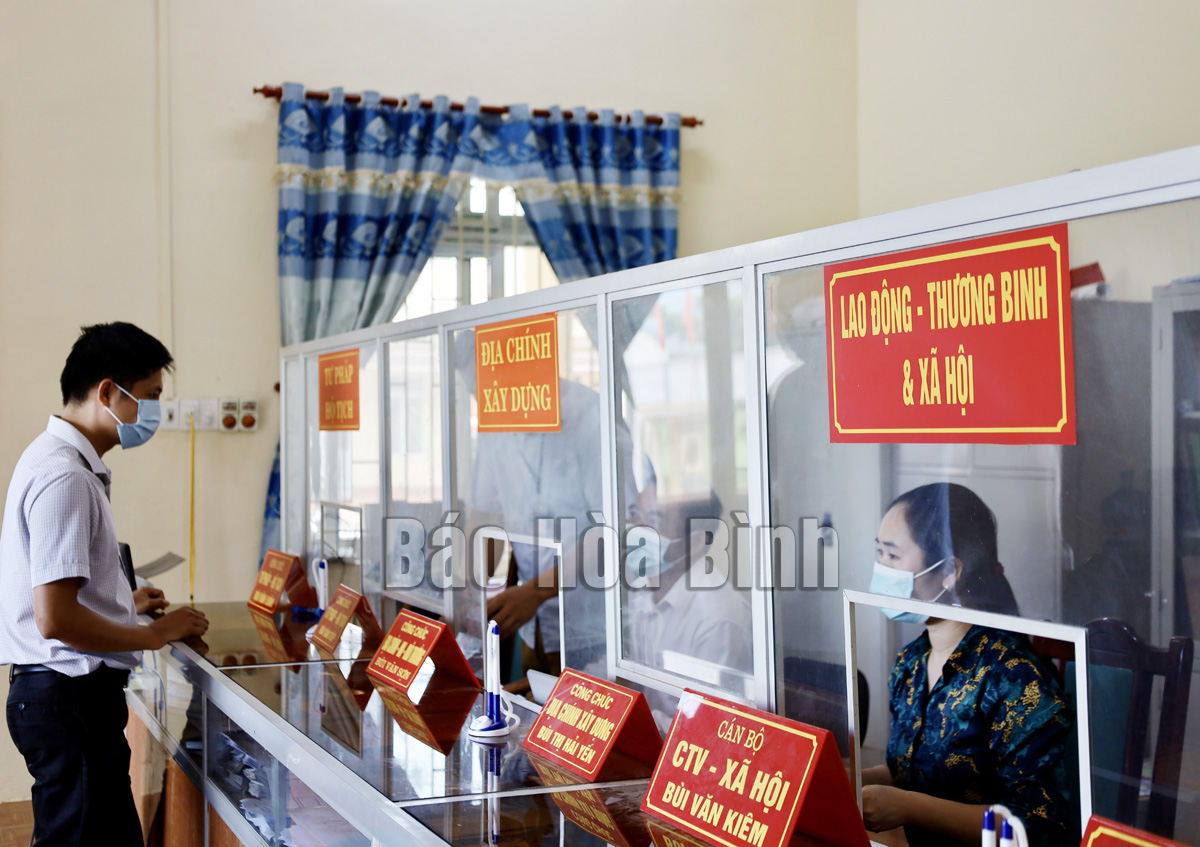
(HBO) - In addition to positive changes in personnel work in Hoa Binh province’s Lac Son district, there remains a number of shortcomings and inadequacies, such as professionalism among district officials being quite low, a lack of vision, leadership, and management skills among management officers, and commune-level officials being mostly from the grassroots level and not being trained from the very beginning, resulting in limited quality and effectiveness.

Public
servants in administrative procedures department in Yen Nghiep commune, Lac Son
district meet professional requirements and constantly improve the quality of
service.
Over the past five years, Lac Son
district has had 121 district and commune officials that hold university degrees,
39 with Master’s degrees, and 29 trained in a high level of political theory. Staff
rotation has received due attention, and personnel planning and appointments have
strictly followed regulations and processes.
The inspection, supervision, and punishment
of officials and Party members are conducted strictly, strengthening internal discipline.
Political and ideological education has been enhanced, with more training held to
disseminate guidelines from the Party as well as policies and laws.
In December 2021, the District Party
Committee issued Resolution No 09-NQ/HU, clearly defining the role of officials
as being key to all tasks. It also sets a goal of building a contingent of officials
with capacity and prestige on par with the tasks at hand and sufficient in quantity
and quality, with a structure suitable for fulfilling tasks and the socio-economic
development strategy.
In the 2021-2025 period, the district
is working to have all newly-recruited staff at the district and commune levels
possess university degrees, and all communes and towns are to have at least one
key leader who is not a local citizen.
According to Nguyen Ngoc Diep, Secretary
of the District Party Committee, in order to see a drastic change in personnel work,
the district is determined to implement the following solutions. Newly-recruited
district and commune officials must have university degrees, priority will be given
to those undertaking long-term and focused training, and staff recruitment and planning
must be in line with task requirements.
Staff evaluations must be substantive,
objective, and accurate. Staff planning is to be in line with processes and regulations.
Regular inspections and supervision will be conducted on the performance of duties
and responsibilities by officials and Party members./.
Hoa Binh province is undergoing a dynamic transformation amid Vietnam’s national digital transition. Building on Poliburo’s Resolution No. 57-NQ/TW on breakthroughs in science, technology, innovation, and national digital transformation, the province has rolled out a wide range of practical action plans. A standout initiative is the "Digital Literacy for All” movement, an effort to ensure that no one is left behind in the digital era.
Hoa Binh province is undergoing a dynamic transformation in the wake of the national digital transformation movement. Building on Resolution No. 57-NQ/TW of the Politburo on breakthroughs in science, technology, innovation, and national digital transformation, the province has implemented a wide range of practical action plans. A standout initiative is the "Digital Literacy for All” movement ambitious effort to ensure that no one is left behind in the digital age.
With a spirit of unity and proactive problem-solving, the Party Committee, the government and the people of Dong Lai Commune (Tan Lac District) have made great strides in implementing the resolutions of the 24th Party Congress of the commune for the 2020 - 2025 term. Focusing on leadership and practical actions, the commune has brought the Party’s resolutions into daily life, creating strong impacts and pushing the local development forward.
Amid the nationwide push for digital transformation, young people in Hoa Binh Province are stepping up as dynamic pioneers, applying technology to enhance Youth Union operations and expand the reach of youth-led initiatives. Through creativity and adaptability, Youth Union organizations at all levels have introduced a series of practical solutions, contributing to modern governance and community development.
In recent years, An Nghia commune, located in Lac Son district, has stepped up administrative reform, focusing on improving the quality and efficiency of its single-window service unit for receiving and processing administrative procedures. These improvements have helped create favourable conditions for local residents and organisations to handle administrative procedures, contributing to the commune’s broader socio-economic development.
The Prime Minister-approved master plan to develop the multi-use value of forests ecosystems through 2030, with a vision to 2050, aims to improve the management and sustainable use of forest resources, create jobs, increase incomes, and improve the living standards of ethnic minorities, people in mountainous and remote areas, forest workers and those living near forests.



